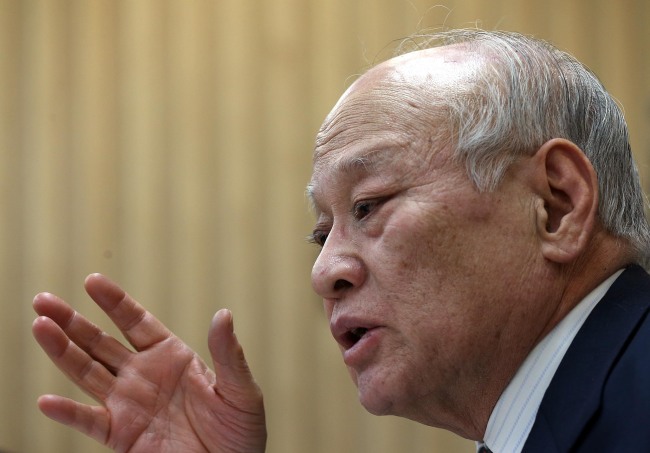President-elect Park Geun-hye on Thursday named former Constitutional Court chief Kim Yong-joon to head her transition team and set up committees on grand unity and youth.
The ruling Saenuri Party’s chief policymaker Rep. Chin Young was tapped as the deputy chief, while former Democratic United Party chairman Han Gwang-ok will chair the committee for people’s grand unity. First-term lawmaker Kim Sang-min will head the special committee for youth.
“The 18th presidential transition committee will bring in all talented figures regardless of their regional base based on expertise, ability to run the state, their patriotism and integrity,” said Park’s senior spokesman Yoon Chang-jung at a press conference announcing the first round of the lineup.
He explained the two committees will not be operated as sub-committees but as parallel organizations with the transition committee.
Kim, 74, served as head of the top court in 1994 and had joined Park’s election campaign as co-chairman of the Central Elections Committee. Kim’s solid conviction to do with the law and social safety will enable him to prepare a smooth launch of the new government, Yoon said.
Kim graduated summa cum laude from Seoul National University School of Law and became the first Supreme Court justice to have suffered polio. Kim is currently the counsel for Nexus Law Group.
He is also well known for having made rulings in 1963 in favor of former Army Chief of Staff Song Yo-chan who was arrested for having written an article against the presidential bid of then-acting president Park Chung-hee, Park Geun-hye’s father.
During his tenure at the Constitutional Court, he made various landmark rulings such as his decisions on the unconstitutionality of a ban against private tutoring and prohibition of marriages between those of the same surname.
Chin, who had quietly helped Park’s campaign as vice chairman for the Committee to Pursue People’s Happiness, oversaw the drafting of Park’s key pledges. The judge-turned-politician is considered one of key pro-Park members with friendly relations with the rivaling faction loyal to President Lee Myung-bak and is well known to be reticent and cautious.
Han Gwang-ok, who hails from opposition-strong South Jeolla Province, also continues his role from the campaign committee by heading the committee on people’s grand unity.
He was a chief of staff under the former Kim Dae-jung government and helped Park underscore her push for reconciliation with the victims of the iron-fisted rule of her father and former democratic activists during her campaign.
His record of involvement in bribery had prompted Park’s chief political reform strategist Ahn Dae-hee to protest his participation.
“Han is someone that can pursue the harmony between regions and the forces representing industrialization and democratization, in order to heal our society’s conflict and contribute greatly to achieving a 100 percent Korea,” Yoon said.
Han is joined by another former DUP member Kim Kyung-jae, who will be the senior vice chairman for the committee.
Kim entered politics by assisting Kim Dae-jung in 1972 and spent more than 15 years in the United States in exile after protesting the rule of Park Chung-hee. Kim had also helped former President Roh Moo-hyun win his election in 2002. Upon Roh’s defection to the Uri Party, he became one of Roh’s sharpest critics.
Vice chairpersons for the committee include John Linton, director of the Severance Hospital International Health Care Center; Yoon Joo-kyeong, director of the memorial committee for late patriot Yun Bong-gil; and Kim Joong-tae, former president of SNU’s research body on nationalism and a former victim of the “Inhyeongdang” case.
Heading the special committee on youth to implement policies for the young generation such as in fighting low employment is Rep. Kim Sang-min, who helped Park reach out to younger voters with such pledges as cutting college tuition. He had led a college students’ volunteer group before joining politics.
Among the committee members are former university association member Jeong Hyeon-ho, CEO of Neowiz Games Youn Sang-kyu, artistic director Kolleen Park, president of Ecomom Korea Ha Ji-won, chairman of the Saenuri Party youth committee Oh Shin-hwan and Channel A journalist Lee Jong-shik.
The first batch of personnel lineup for the transition team in charge of devising the new government format was kept in the dark until the last minute. Park’s secluded decision-making style was also apparent as her spokespersons failed to answer many of the follow-up questions on her decisions, saying they too just learned of the decision.
The DUP gave mixed reactions to the announcement, applauding Park’s effort to make fair appointments but criticizing her uncommunicative style.
“It is believed the personnel decisions were generally not biased and we can see that Park put a lot of thought into it,” said DUP spokesman Rep. Jung Sung-ho, adding that the installment of the two committees were especially laudable.
Jung, however, also continued to criticize Park’s spokesman Yoon as unfit for the job. Yoon, a conservative journalist-turned-columnist, had made a string of controversial remarks against the liberal candidates throughout the election period in his commentaries.
Meanwhile, President Lee and Park will be meeting for the first time since her Dec. 19 election on Friday at 3 p.m. at Cheong Wa Dae, the president-elect’s spokesman Park Sun-kyoo said at a press briefing.
The two will be discussing a wide range of issues including economy, inter-Korean relations, foreign affairs, security and welfare, he said.
The meeting to take place nine days after her election will be conducted without anyone else attending. Their last meeting was on Sept. 2.
The outgoing and incoming leaders will share “very important matters for successful state management,” Park said.
He added, “Their meeting is all the more significant in political history as this year’s presidential election was the first since 1987, when the direct presidential election system was reintroduced, that the incumbent president had not left the ruling party.”
By Lee Joo-hee (
jhl@heraldcorp.com)









